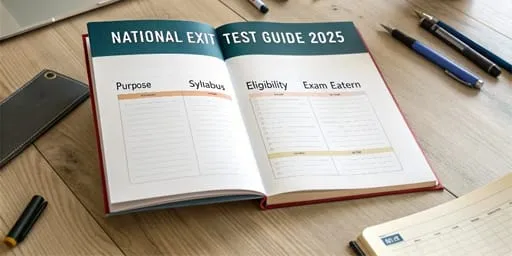National Exit Test Guide 2025: Purpose, Syllabus, Eligibility, and Exam Pattern

Contact Us
The National Exit Test (NExT) is set to revolutionize medical education and licensing in India, offering a unified examination for MBBS graduates to obtain a medical license, qualify for postgraduate (PG) admissions, and complete their MBBS degree requirements. As a comprehensive National Exit Test guide, this blog delves into the purpose, syllabus, eligibility, exam pattern, preparation strategies, and challenges of the NExT exam, scheduled for August 2025. Whether you’re a final-year MBBS student or a foreign medical graduate, this guide provides everything you need to navigate this transformative medical licensing exam.
What is the National Exit Test?
The NExT exam is a mandatory postgraduate-level examination introduced under the National Medical Commission (NMC) Act, 2019, to streamline India’s medical education and licensing system. It replaces multiple exams, including:
- Foreign Medical Graduate Examination (FMGE): For foreign medical graduates seeking to practice in India.
- National Eligibility cum Entrance Test for Postgraduate (NEET PG): For PG medical course admissions.
- Final MBBS exams: For MBBS degree completion.
- Institute of National Importance Combined Entrance Test (INI CET): For admissions to prestigious institutes like AIIMS, JIPMER, and PGI Chandigarh.
The National Exit Test guide highlights NExT’s role as a single-window exam that ensures uniform competency standards, enhances clinical skills, and simplifies the evaluation process for both Indian and foreign medical graduates.
Purpose of the NExT Exam
The NExT exam serves multiple objectives, making it a cornerstone of India’s medical education reform. This NExT guide outlines its key purposes:
- Licensing: Grants a medical license to practice in India, ensuring only competent doctors enter the healthcare system.
- MBBS Certification: Acts as the final qualifying exam for MBBS students, replacing traditional university exams.
- PG Admissions: Determines merit-based eligibility for postgraduate medical courses, streamlining admissions.
- Standardization: Ensures uniform competency across medical colleges, addressing disparities in government, private, and foreign institutions.
- Global Recognition: Enhances the international credibility of Indian medical graduates by aligning with global clinical standards.
By unifying these functions, NExT supports India’s “One Nation, One Exam” vision, reducing the burden of multiple exams and fostering a skilled medical workforce.
Eligibility for the NExT Exam
Understanding who can take the NExT exam is crucial for aspiring candidates. This guide details the eligibility criteria:
- Indian MBBS Students: Final-year MBBS students enrolled in NMC-approved medical colleges are eligible.
- Foreign Medical Graduates (FMGs): Candidates with an MBBS degree from NMC-approved foreign institutions must clear NExT within two years of completing their degree to practice in India.
- Internship Requirement: Candidates must complete a mandatory one-year internship after passing NExT Step 1 to be eligible for NExT Step 2.
- Academic/Observership Candidates: Individuals with medical degrees pursuing NMC-approved academic courses or observerships can also apply.
The flexibility of unlimited attempts and a three-year score validity for PG admissions makes NExT accessible to diverse candidates.
Eligibility for the NExT Exam
The NExT exam 2025 is a pivotal event for the 2020 MBBS batch, with a phased rollout planned. This National Exit Test guide provides the latest timeline based on NMC updates:
|
Event
|
Expected Date
|
|---|---|
|
Mock Test
|
Early 2025 (TBD)
|
|
NExT Step 1
|
August 2025
|
|
Internship Completion
|
January/February 2026
|
|
NExT Step 2
|
February 2026
|
Note: NExT will be conducted twice annually (May and November) starting in 2025, offering flexibility for candidates. A previous 2023 mock test was canceled due to protests, underscoring the need for clear communication and preparation support.
NExT Exam Structure and Pattern
The NExT exam pattern is designed to assess both theoretical knowledge and clinical competency. This guide breaks down the two-step structure:
NExT Step 1
- Format: Computer-based test with 540 multiple-choice questions (MCQs).
- Duration: Conducted over three days, with two shifts daily.
- Subjects: Six papers covering Medicine & Allied Subjects, Surgery & Allied Subjects, Obstetrics & Gynaecology, Paediatrics, Otorhinolaryngology, and Ophthalmology.
- Question Distribution:
- 60% Problem-solving questions
- 30% Comprehension and analysis
- 10% Recall-based questions
- Passing Criteria: Minimum 50% marks.
- Validity: Scores are valid for three years for PG admissions.
NExT Step 2
- Format: Offline practical/clinical exam, conducted after the mandatory internship.
- Assessment Methods: Clinical case scenarios, viva voce, and objectively structured clinical examinations (OSCEs).
- Grading: Competent (Pass) or Non-Competent (Fail).
- Purpose: Evaluates clinical diagnosis, patient examination, decision-making, and communication skills.
Key Features:
- Step 1 is centralized, conducted by AIIMS, New Delhi.
- Step 2 is managed by state medical universities or authorized institutions.
- Unlimited attempts are allowed, offering flexibility.
The NExT guide emphasizes that NExT’s focus on clinical skills differentiates it from NEET PG’s recall-heavy format, aligning with global medical education standards.
NExT Syllabus 2025
The NExT syllabus is aligned with the MBBS curriculum, emphasizing practical and clinical knowledge. This NExT guide outlines the key components:
- Clinical Subjects: Medicine & Allied Subjects, Surgery & Allied Subjects, Obstetrics & Gynaecology, Paediatrics, Otorhinolaryngology, Ophthalmology.
- Pre-Clinical and Para-Clinical Subjects: Integrated into the syllabus to support clinical applications (e.g., Anatomy, Physiology, Pathology).
- Focus Areas:
- Clinical diagnosis and patient examination
- Clinical decision-making and treatment planning
- Practical and communication skills
- Real-world medical scenarios
The syllabus, released by AIIMS, New Delhi, is available at the official NExT portal, ensuring candidates have access to standardized resources. Unlike NEET PG, NExT prioritizes applied knowledge, making it slightly easier for candidates with strong MBBS fundamentals.
Who Conducts the NExT Exam?
The National Exit Test guide clarifies the roles of conducting bodies:
- NExT Step 1: Conducted by AIIMS, New Delhi, ensuring a centralized, standardized process. Registration and syllabus details are available at the official NExT portal.
- NExT Step 2: Managed by state medical universities or NMC-authorized institutions, allowing localized clinical assessments.
AIIMS’s involvement leverages its expertise, while state-level execution for Step 2 ensures practical assessments reflect regional healthcare needs. However, coordination between central and state authorities is critical to maintain consistency.
Advantages of the NExT Exam
The National Exit Test guide highlights NExT’s transformative benefits:
- Unified Evaluation: Eliminates the need for multiple exams (FMGE, NEET PG, INI CET, MBBS finals), reducing student stress.
- Clinical Focus: Prioritizes practical skills, producing doctors better equipped for real-world challenges.
- Flexibility: Unlimited attempts and three-year score validity offer candidates multiple opportunities to succeed.
- Standardization: Ensures uniform competency across diverse medical colleges, addressing quality disparities.
- Global Alignment: Enhances the international credibility of Indian medical graduates, supporting career mobility.
These advantages position NExT as a game-changer, aligning India’s medical education with global standards and supporting the NMC’s mission to improve healthcare quality.
Challenges and Criticisms
Despite its benefits, the NExT exam faces several challenges, as outlined in this National Exit Test guide:
- Implementation Delays: Repeated delays (e.g., 2023 mock test cancellation) and stakeholder protests highlight logistical and communication issues.
- Stakeholder Resistance: The Indian Medical Association (IMA) and students argue that existing exams were sufficient, raising concerns about fairness and readiness.
- Educational Disparities: Newer private and foreign medical colleges may lack quality faculty, potentially leading to higher failure rates among their students.
- Logistical Challenges: State-level execution of Step 2 risks inconsistent standards, requiring robust coordination.
- High Coaching Costs: The exam’s novelty and limited preparation resources have led to expensive coaching programs, burdening students.
- Extended Duration: The mandatory internship and proposed rural/tribal service requirements may prolong medical education timelines.
Addressing these challenges through clear guidelines, stakeholder engagement, and educational reforms is essential for NExT’s success.
Preparation Tips for NExT 2025
This National Exit Test guide offers practical strategies to excel in the NExT exam:
- Understand the Syllabus: Focus on the six core subjects and prioritize clinical applications. Use the official AIIMS syllabus as a roadmap.
- Practice Clinical Scenarios: Prepare for Step 2 by practicing OSCEs, clinical case studies, and patient interaction simulations.
- Leverage Mock Tests: Participate in the 2025 mock test to familiarize yourself with the computer-based format and improve time management.
- Use Standard Resources: Study MBBS textbooks (e.g., Harrison’s Principles of Internal Medicine, Bailey & Love’s Surgery) and online platforms offering NExT-specific content.
- Focus on Problem-Solving: Since 60% of Step 1 MCQs are problem-solving, practice case-based questions to build analytical skills.
- Time Management: Simulate exam conditions to handle the 540-MCQ, three-day Step 1 format without fatigue.
- Stay Updated: Monitor NMC and AIIMS announcements for syllabus updates, mock test dates, and registration details.
For foreign medical graduates, additional focus on Indian clinical guidelines and patient management protocols is crucial to adapt to NExT’s format.
NExT and Foreign Medical Graduates
The National Exit Test guide underscores NExT’s significance for foreign medical graduates (FMGs):
- Unified Licensing: NExT replaces FMGE, providing a standardized pathway for FMGs to practice in India.
- Two-Year Rule: FMGs must clear NExT within two years of completing their MBBS, ensuring timely licensing.
- Challenges: FMGs may find NExT’s clinical focus harder than FMGE’s recall-based format, requiring targeted preparation.
- Opportunities: Passing NExT allows FMGs to pursue PG courses and practice in India, enhancing career prospects.
FMGs should prioritize resources aligned with Indian medical standards and practice clinical scenarios to bridge any gaps in training.
Future Implications of NExT
The NExT exam is poised to transform India’s medical education landscape. This guide explores its long-term impact:
- Improved Healthcare Quality: By ensuring only competent doctors are licensed, NExT will enhance patient care and safety.
- Educational Reforms: The exam’s clinical focus may drive improvements in medical college curricula, particularly in under-resourced institutions.
- Increased Medical Seats: The 2025 Union Budget’s plan to add 75,000 medical seats over five years will support NExT’s goal of producing more qualified doctors.
- Global Competitiveness: NExT’s alignment with international standards will boost the global mobility of Indian medical graduates.
- Stakeholder Collaboration: Ongoing NMC webinars and feedback processes indicate a commitment to refining NExT based on stakeholder input.
However, addressing faculty shortages, standardizing Step 2 assessments, and managing coaching costs will be critical to realizing these benefits.
The National Exit Test guide for 2025 offers a comprehensive roadmap for MBBS students and foreign medical graduates preparing for this transformative exam. By unifying licensing, MBBS certification, and PG admissions, NExT streamlines India’s medical education system, ensures clinical competency, and aligns with global standards. Despite challenges like implementation delays and educational disparities, NExT’s advantages—flexibility, standardization, and reduced exam burden—position it as a game-changer. With the right preparation, including syllabus-focused study, mock tests, and clinical practice, candidates can excel in NExT 2025 and contribute to India’s evolving healthcare landscape.
For more Information about medical Education in India or Abroad – contact us
FAQs
1. What is the purpose of the NExT exam?
The NExT exam grants a medical license, serves as the final MBBS qualifying exam, and determines merit-based admission to postgraduate medical courses, replacing FMGE, NEET PG, and INI CET.
2. Who is eligible to appear for NExT 2025?
Final-year MBBS students from NMC-approved Indian or foreign medical colleges are eligible. Foreign graduates must clear NExT within two years of their MBBS, and candidates need a one-year internship after Step 1 to take Step 2.
3. What is the NExT exam pattern?
NExT has two steps: Step 1 is a computer-based test with 540 MCQs (60% problem-solving, 30% comprehension, 10% recall) across six subjects, requiring 50% to pass. Step 2 is an offline practical exam with OSCEs and clinical scenarios, graded as Pass/Fail.
4. When will the NExT exam be conducted in 2025?
NExT Step 1 is scheduled for August 2025, with a mock test earlier in 2025. Step 2 is expected in February 2026 after internship completion, with exams conducted twice yearly (May and November).
5. How can I prepare for the NExT exam?
Study the AIIMS-released syllabus, practice clinical scenarios and problem-solving MCQs, use standard MBBS textbooks, participate in mock tests, and stay updated on NMC announcements for effective preparation.







